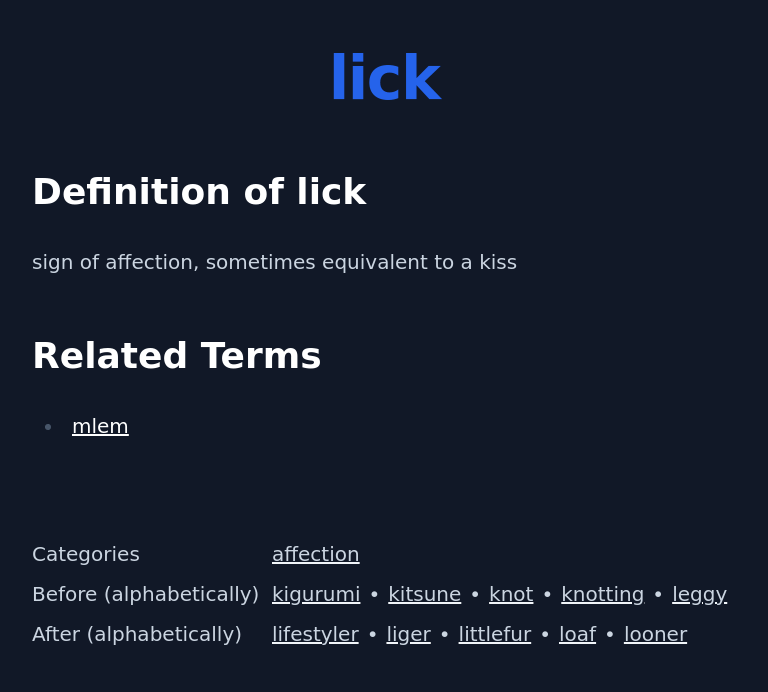The term "lick" has evolved in various contexts, often leaving people puzzled about its meaning, especially when paired with the word "stealing." In contemporary slang, "lick" can refer to a robbery or theft, giving rise to the phrase "lick definition stealing." This term encapsulates a specific type of theft often characterized by its cunning and opportunistic nature. As we unravel this term, we will explore its implications and the societal perceptions surrounding it.
Throughout history, language has transformed, adapting to cultural changes and societal norms. The phrase "lick definition stealing" reflects this evolution, particularly within urban communities where slang is a powerful means of communication. Understanding this phrase will not only provide insight into the act of stealing but also offer a glimpse into the social dynamics that accompany such actions.
As we delve deeper into the topic, it becomes clear that "lick definition stealing" goes beyond mere theft; it encompasses a lifestyle, a mindset, and sometimes even a survival mechanism. This article aims to dissect the various layers of this phrase, providing context, examples, and a broader understanding of its significance in today's world.
What Is the Origin of the Term "Lick" in Relation to Stealing?
The term "lick" in the context of stealing has its roots in African American Vernacular English (AAVE). It is believed to have originated from the idea of "taking a lick" or "getting a lick," which signifies the act of successfully executing a theft. Over time, this term has permeated popular culture, gaining recognition in music, film, and street vernacular.
How Has the Meaning of "Lick" Changed Over Time?
Originally, "lick" was a more general term associated with various meanings, such as a small amount of something or a light touch. However, as it began to be used in the context of crime, its meaning shifted dramatically. The evolving connotation reflects changes in societal attitudes towards crime, particularly in urban settings where such slang has flourished.
What Are Some Contemporary Uses of "Lick" in Media?
In recent years, the term "lick" has become popular in various forms of media. From hip-hop lyrics to social media trends, it is often used to describe high-stakes thefts or heists. This portrayal can glamorize the act of stealing, presenting it as an adventurous or daring endeavor rather than a crime with serious consequences.
What Does "Lick Definition Stealing" Imply About Society?
The phrase "lick definition stealing" raises important questions about societal values and the normalization of crime. It suggests a cultural acceptance of theft as a means of survival, particularly in marginalized communities. This perspective can lead to a complex dialogue about poverty, crime, and the systemic issues that contribute to such behaviors.
Are There Positive Aspects to Understanding "Lick Definition Stealing"?
Understanding the concept of "lick definition stealing" can provide valuable insights into human behavior and societal conditions. By examining the motivations behind such actions, we can foster empathy and better comprehend the struggles faced by individuals in challenging environments. This understanding can pave the way for more effective crime prevention strategies and community support initiatives.
What Are the Legal Implications of "Lick Definition Stealing"?
Legally, stealing—regardless of its definition or the slang associated with it—is a crime punishable by law. The consequences can vary significantly based on the severity of the crime, the amount stolen, and the jurisdiction. Understanding the legal implications can help individuals recognize the risks involved in engaging in such activities.
How Can Society Address the Issues Surrounding "Lick Definition Stealing"?
Addressing the root causes of "lick definition stealing" requires a multifaceted approach. Community programs that focus on education, job training, and social support can help mitigate the circumstances that lead individuals to resort to theft. Additionally, fostering open discussions about crime and its societal impacts can promote awareness and understanding.
- Community outreach initiatives
- Educational programs
- Job training and employment opportunities
- Support for at-risk youth
What Role Does Media Play in Shaping Perceptions of "Lick Definition Stealing"?
The media plays a significant role in shaping public perceptions of crime, including the concept of "lick definition stealing." Through sensationalized reporting, movies, and music, media portrayals can influence how society views theft, often romanticizing or trivializing the act. This can create a disconnect between the reality of crime and the perceptions held by the public.
What Can Individuals Do to Combat the Misconceptions Around "Lick Definition Stealing"?
Individuals can combat misconceptions by engaging in informed discussions about crime and its societal implications. Advocating for community support programs and educating others about the complexities surrounding theft can help shift perspectives. Additionally, promoting positive narratives in media can contribute to a more balanced view of crime and its consequences.
In conclusion, the phrase "lick definition stealing" embodies a complex interplay of language, culture, and societal values. By understanding its origins, implications, and the factors that contribute to its prevalence, we can engage in meaningful conversations that address the underlying issues associated with theft. This knowledge empowers us to advocate for change and foster a more empathetic society.



